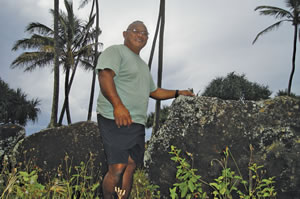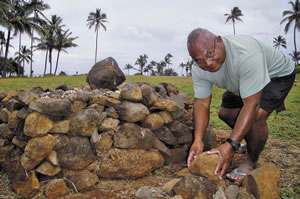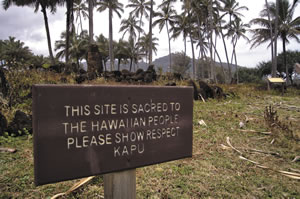The Keeper Of The Sacred Stones

Jimmy Alalem has a personal interest in the rocks. Coco Zickos photos
Jimmy Alalem may be controversial to some, but that dosn’t deter him from volunteering to maintain a historic East side heiau
Standing strong against the eastern horizon, the massive pohaku of the Hikina a ka la heiau are more than just ancient stones to Jimmy Alalem. They are a sacred representation of Hawaiian wisdom and an essential reminder of the island’s past.
It is for this reason that Alalem has taken it upon himself to protect the historic Wailua site, serving as its kahu, or caretaker.
“For me, it’s to keep history,” he says of his diligent work to preserve the structure, “so that the children do not forget where they came from, who they are and where they belong. And so they don’t forget about their ancestors who are the ones who actually built these.”
Each heiau, or ancient spiritual site, serves a separate purpose, yet collectively they represent universal symbols of peace, respect, honor and love.
“All the good things,” says Alalem.
Hikina a ka la, in particular, was once considered a place of refuge for criminals seeking forgiveness.
“This was to cleanse yourself when you broke a kapu or law,” Alalem says, explaining the East side memorial’s significance in Hawaiian history.
It also was a special place for the ancient people, as the vast expanse of the horizon makes it one of the most ideal spots to witness the sun’s first morning rays.

Alalem replaces fallen stones
“All the heiaus, all the sites should be left alone,” Alalem says, “no buildings, no nothing. All this beach area should be opened and maintained like how it’s supposed to be.”
Since 2007, Alalem has tried faithfully to keep Hikina a ka la in its original state by plucking weeds, mowing the grass, shifting stones to their proper places and keeping invasive species at bay. And even though the state receives funding to maintain Kaua’i heiaus under historic preservation, Alalem does all the work voluntarily.
“They get big money. And yet, they throw it in this general fund that goes for everything else but the heiau,” he says.
Nonetheless, Alalem continues what he deems his labor of love in addition to safeguarding the ancient culture.
“The wisdom and knowledge given to me is for the children and the people,” he says of his many self-taught skills such as wood-and stone-carving.
Even though he is unsure of his precise ancestry aside from lineage tracing back to the Philippines, Alalem says he does not take his knowledge for granted. He has made everything from relief carvings of birds and coconut trees to stone bowls and poi pounders – traditions he learned on his own and has already passed on to many others.
Still, Alalem does not receive a penny for his work.
“Because of the gift that I was given, I cannot even ask for 1 cent,” says Alalem, who has taught youths at Queen Liliuokalani Children’s Center following Hurricane Iwa. “And when I make something like a stone implement or wood carving and I give it freely, people don’t understand, and they always get mad at me. But it’s not about money; it’s not about being rich or being famous. Why can’t you just be yourself and be happy by giving things that you want to give and put a little smile on a person’s face and make their day?”
It’s values such as these that Alalem imparts to Island keiki, such as Kaua’i High School students not allowed to attend regular classes for disciplinary reasons.
“I was teaching spirituality and how to love themselves, no matter how people treat them, because that’s what they were lacking,” says Alalem, who also was working for the state’s Division of Forestry and Wildlife at the time. “I never had any problems with them.”
He also has schooled children across the island on heiaus, gardens, Polynesian weaponry and native plants – a task that many may not have the time or patience to tackle.
Hawaiian sovereignty is another passion for Alalem.
“People are afraid because they might lose their house and things like that,” he says of the governing body he and a group of others on island wish to implement. “But nothing is going to change; they’ll still keep they’re houses. The only thing that will change is the government.”

Pay attention to the sign and show respect. Coco Zickos photo
A non-United States government for the people and by the people, not for the government and only for the government, is what individuals like Alalem stand for.
“Where everybody has an equal say in things – not one-sided,” he says. “All people of all races.”
In the meantime, while modern-day society continues to neglect Hawaiian history, Alalem says he hopes to help restore harmony.
“We’ve been dragged so far away from our culture because of the Western ways of thinking: cell phones, video games, TV. Everything in Hawaii – which we have lost – was to have balance. But because of the way everything is all greed now, we forget about that.”
The proposed Wailua bike bath is anything but harmonious, according to Alalem, who is among those currently fighting against its construction through the sacred area.
“We’re telling them no because the land is sacred and it’s supposed to be left alone,” he says.
Wailua has always had a special place in Alalem’s heart, which explains his passion to keep the area as free from development as possible.
“My mom took us to the Wailua River mouth to swim as soon as we could walk,” he says of his mother, Mary, who worked for Kaua’i Coast Resort.
The 1975 Kapaa High School graduate also recalls that the Waipouli area where he was born once housed only one general store and a service station.
“At that time there was nothing, just pasture lands. Houses were far apart – never had McDonald’s, never had Taco Bell,” he says.
His grandfather was the first of Alalem’s family to arrive here from the Philippines in the late 1800s to early 1900s. Alalem’s father Sebastian was raised in a Filipino camp called River Street, where he worked until landing a job in maintenance at Coco Palms when the hotel opened in the 1960s.
His mother’s history, however, is not so clear, and Alalem believes it is from her side of the family his possible Hawaiian heritage generates. Even so, because he has no proof of his ancestral heritage, he is routinely chastised for the work he does.
“A lot of times people question if I’m Hawaiian or not,” says Alalem, who considers himself the kahu of other East side heiaus as well. “I get criticized all the time, every day of my life. I just try to ignore them.”
But Alalem’s path in life, which includes a stint in the military and working as a delivery person for Otsuka’s, hasn’t always been as clear as he says it is now.
“I like what I’m doing, so please do not condemn me for what I am,” says Alalem, who is currently unemployed and says he “doesn’t need money.”
“We forget,” he says of ancient values, “people, they like everything. They like, they like, they like. And they go further, further, further. They want money, fame and glory. They forget to stop and to enjoy. Close your eyes, feel the peace again.”



